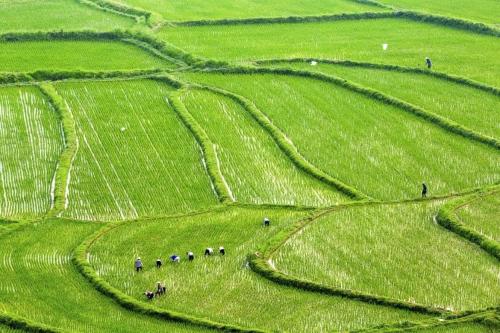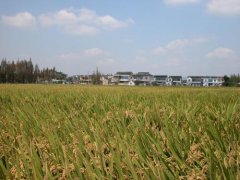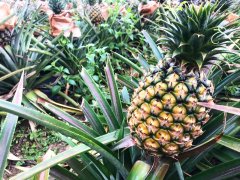What is the impact of the Organic Agriculture Promotion Law on agriculture after the formal implementation of the Organic Agriculture Promotion Law
The Law on the Promotion of Organic Agriculture was promulgated on May 30th of the last (2018) year, and tomorrow (30) will be the official date for the implementation of the law. In view of the illegal occupation of agricultural land by factories, Chen Jizhong, chairman of the Council of Agriculture, stressed that "agricultural land is absolutely for agricultural use and must not harm agricultural land." the amendment of the Labor Assistance Law should include a 10-year sunset time limit, and factory pollution should be judged jointly by the Council of Agriculture and the Environmental Protection Agency. After the law is on the road, it will provide counseling resources to promote organic friendly production and marketing counseling, talent training and education promotion, exemption from pollution in neighboring fields, and preferential rental terms for public rental land.
2020 organic friendly farming area, which is expected to increase to 15000 hectares
Since the promotion of organic and environment-friendly farming in 2016, the organic area has reached 8975 hectares by the end of April this year, and the area of friendly farming has reached 3237 hectares, a total of 10, 2194 hectares, accounting for about 1.5% of the total arable land in China. Chen Jizhong said that the goal next year is to increase the area of organic and environmentally friendly farming to 15000 hectares.
In the Organic Agriculture Promotion Law, the second chapter, "Organic Agriculture extension", contains a number of key rules for the promotion of organic agriculture. In Article 4, "the competent authority promotes organic agriculture", apart from encouraging organic farmers to obtain certificates through third-party verification, they can also formulate a set of rules through farmers' associations and examine and verify the rules by the Agriculture and Food Department. can be officially recognized as "friendly farming".
Arrange organic tutoring resources, promote marketing, and publish the results every four years
In Article 5, the Organic Agriculture Promotion Program contains a detailed implementation framework, including guidance resources, which are included in development planning, production and marketing guidance, incentives and subsidies, scientific and technological research and development and talent training, and organic education and promotion. and the results of the implementation are announced to the public every four years. And the original incentives and subsidies will continue to be promoted. Including: land subsidies of 30,000 to 80,000 yuan per hectare for organic and environment-friendly farming; subsidies for verification fees, greenhouse nets, agricultural machinery and equipment, and organic fertilizers, etc.
Organic farmers will not be punished if they are polluted by neighboring fields.
In addition, the responsibility of organic agriculture for "adjacent field pollution" is also guaranteed in this law. Nong Tseng, the monitor of the organic rice production and marketing class in Yuli Township, Hualien, says that organic fields are often opposed to neighboring fields. "We (organic fields) don't want to be sprayed with pesticides, and next door (habitual fields) think we control too much. "this law stipulates that if agricultural land is contaminated by neighboring fields, farmers will not be punished, but the contaminated products cannot be sold in the name of organic.
Organic farmers have a 40% discount on rent with a lease guarantee of 10 ─ for 20 years.
In order to promote more people to participate in organic agriculture, the law also provides land rental concessions and promotes district applications. Farmers who lease public land or land from state-owned enterprises such as Taiwan Sugar for organic farming will enjoy a rent discount of 60% of the original rent and a lease guarantee of not less than 10 years and less than 20 years.
In addition, if townships and towns take the initiative to apply for "organic agriculture promotion areas", priority will be given to providing assistance and incentives. It includes production and marketing equipment, seed breeding and seedling production, capital loans and verification fees.
Nutritious lunch and National Legion meal give priority to the use of organic ingredients.
In terms of domestic product marketing, Chen said that the school nutritious lunch and the National Army meal are the two major marketing channels at present. At present, the total amount of organic food used each week is 163 tons, of which New Taipei City, Taoyuan City, Hualien County, Pingtung County, and Ilan County are all schools for at least one meal of organic vegetables or organic rice per week. Hsinchu County and Taipei City also have plans to follow.
Hu Zhongyi, director of the Agriculture and Food Administration, added that in terms of access, there are currently 130 organic counters (including organic shops and volume outlets in major regions, etc.), which are expected to increase to 210 next year, and there are also 18 organic farmers' bazaars for consumers to buy organic products.
Sign organic "equivalence agreements" with other countries
For the part of organic products exported abroad, Chen said that starting from this year, organic equivalence agreements will be signed with other countries one after another, and it is guaranteed that the equivalence agreements for all imported organic agricultural products to Taiwan will be completed in May next year. The Agriculture and Food Department further stated that Australia, New Zealand, India and Japan are all in the final stage of the agreement, which is expected to be completed in June and July this year (2018). Paraguay has also proposed to Taiwan to sign an equality agreement.
Committee of Agriculture: if the agricultural land is illegal and the factory has not been legal for 10 years, the factory should be withdrawn.
In addition to the pollution of organic fields by neighboring fields, the pollution of illegal factories on agricultural land is also an urgent issue today. Yesterday (29), the negotiation of the "Factory guidance Management Law" was cancelled for some reason. It is not clear whether the farmland can be restored to agricultural use and how it will no longer be polluted by the factory.
When the Council of Agriculture in charge of agricultural land was asked this question, Chen Jizhong said that "agricultural land should definitely be used for agricultural use and agricultural land should be protected." he believes that all new factories after 520 should be demolished immediately, and if the local government does not implement them, it will be demolished by the central government. In addition, after obtaining specific registration, if the factory does not meet the standards and obtain the relevant qualification documents in accordance with the guidance, it should withdraw the factory within ten years (that is, the controversial sunset period). As for the determination of the degree of pollution, Chen also said that it should also be returned to the Environmental Protection Agency and the Council of Agriculture.

- Prev

A common plant virus that transforms plant viruses into nano-sized agricultural materials beneficial to crop growth.
In order to reduce the harm caused by diseases and insect pests, farmers will cooperate with the crop growth cycle and apply pesticides appropriately. As most pesticides are not specific, in case of improper application, it may destroy the food web around the farmland, and then affect the balance of the surrounding ecosystem. With the idea of environmental protection
- Next

Pineapple planting prospects: pineapple taste description is very sweet, growers are difficult to cultivate
Golden diamond pineapple is fine and sweet, but it is not easy to grow high-quality pineapple. In Longquan Village, Neipu Township, Pingtung County, Ah Yuan, despite the disapproval or even opposition of his family, still insists on growing pineapples for ten years, growing pride and confidence. He and his wife are also close.
Related
- A one-day flower show brings 130 million yuan in orders! Nanhai, this Phalaenopsis exhibition is amazing
- What do the flower language and meaning of Lutheran tree mean? Precautions for planting Lutheran tree
- Encounter Chaoshan Kongfu tea, not without this cup of Phoenix single clump
- The durian market in Vietnam and Thailand is flooded. The price of imported durian has plummeted by 30-40% in a month.
- Shanghai solved the problem of local vegetable supply by planting 80,000 mu of green leafy vegetables.
- Wageningen University has become the best agricultural university in the world for the seventh time in a row.
- The strongest export season of South African grapes is full of challenges, with exports to Russia falling sharply by 21%.
- Sri Lanka is on the verge of bankruptcy, "Tea for debt" Organic Agriculture Revolution aggravates the Food crisis?
- Turning waste into earthworm manure and worm manure into organic fertilizer-A new choice for auxiliary farming
- Organic rice growers shoulder the responsibility of nurturing agricultural talents! Yinchuan Sustainable Farm with Organic Life Camp

